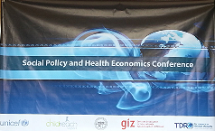“What these short-term impact grants have done is to demonstrate what a crucial contribution they can make to help change people’s thinking,” said Dr Adhikari, one of Nepal’s only full-trained health economists. “Only three to four per cent of people in the health sector here in Nepal have any idea what health economics are all about. What our workshop has achieved is to provide the basics for a wide group of people at the local level. It also provides them with a way of thinking about inputs for improving control or eliminating diseases of poverty." The workshop included a broad mix of academics, government health workers, medical personnel from nongovernmental organizations, students and researchers. This was important, Adhikari added, in order to provide a cross-section with a better link to public health issues from the economic perspective. Another key aspect was that the participants learned how to write proposals for further research. |  Provided by S.R. Adhikari |
 | Ten workshop proposals covering different aspects of Nepal’s problems with infectious diseases and public health were selected and funded by UNICEF and the German development organization, GIZ, in coordination with the local government agencies. The findings from this research were presented at a recent conference in Basel. |
Only 3 to 4 per cent of people in the health sector here in Nepal have any idea what health economics are all about. What our workshop has achieved is to provide the basics for a wide group of people at the local level.
One of these projects, said Dr Adhikari, focused on the impact of road traffic accidents – not just on health services but also the economy. It was soon noticed by the Nepalese traffic police, who have begun to implement better planning. “The
economic value of a motorbike accident can have a greater impact to change the behaviour of the people. We are using this value as part of our training of people,” a Katmandu traffic officer explained to Dr Adhikari when he reviewed the research
results. The project highlighted the need for greater awareness of health economics as well as human behaviour on the roads. “Sometimes people don’t immediately grasp the full implications, but a monetary value helps provide a better understanding,”
he added.
For some participants, the training helped them better understand the concept of health economics. “Previously, whenever doing something in health economics, my inner voice stopped me by saying that dealing with the numbers is not your cup of tea. But the training has now provided me the knowledge and courage to initiate tentative steps in the field,” said Diksha Sapkota, a lecturer with the Kathmandu University School of Medical Sciences working in close collaboration with the Ministry of Health.
 WHO / SEARO /Trine Ladegaard | A better understanding of health economics is a first critical step toward improving the quality of our health services, Adhikari states. “But we now need to move forward. We cannot afford to stop. Those who participated are now thinking health economics, but their capacity is still very limited. We now have the stage so that we can now dance,” said Dr Adhikari, noting that the momentum must not be lost; he is continuing his training with a small team of health economists. |
For more information, contact Edward Kamau.

